A Russian has bought up two of Britain's newspapers.
Alexander Lebedev will reportedly pay the symbolic sum of one pound
to take over ownership of the daily Independent
and the weekly Independent on Sunday.
Lebedev made headlines nearly three years ago when
he bought up the Evening Standard.
RUSSIAN KGB BUYS UK NEWSPAPERS
Lebedev once worked in London for the Soviet intelligence service, the KGB.
In the Soviet Union's high-security embassy there,
he searched the British press for news he could use
in his classified reports to Moscow.
Today Lebedev buys up the papers he once combed through....
The wealthy Russian oligarch, who has interests in banking and aviation,
already co-owns with ex-Soviet leader Mikhail Gorbachev
a 49-percent holding in the Novaya Gazeta newspaper.
...continued from COMMUNISTS ENSLAVE BRITISH FREE PRESS
watch KGB thug Lebedev in TV punch-up (The Russian billionaire -- owner of a stable of British newspapers -- shows a glimpse of his past as a KGB agent during an extraordinary outburst on a TV talk show), YouTube, Sep 18, 2011
An obscure Russian destination is the latest in a new holiday phenomenon known as the 'shapecation'. It is the latest twist in a travel trend that industry observers have labelled the "shapecation". Russian tour operators are reporting a surge of interest in a hitherto little-known archipelago due to its uncanny resemblance to the birthmark of the former USSR leader, Mikhail Gorbachev. The obscure archipelago, which is known as Durak Aprel, is located off the Siberian coast in the far north-east of the country. An aerial photograph highlights the similarity between the group of islands and the brown coloration that marks Mr Gorbachev's forehead -- and that has prompted an influx of visitors to a particularly remote part of the country... Interest in the trips was initially just from Russians, but that he has taken several inquiries in recent weeks from adventurous western holidaymakers. Mr Gorbachev, who celebrated his 80th birthday at London's Royal Albert Hall earlier this week with a group of high-profile politicians and Hollywood film stars, has usually enjoyed higher levels of popularity in the west than in his home country. The interest in the archipelago suggests that he might now be enjoying something of a renaissance in Russia....



RUSSIA TODAY (RT) NEWS WEBSITE
A Counter Intelligence Asset Promoting Psyops and Fake Intelligence Proxies
to Create False Opposition to the Sold-Out Mainstream Media
Moscow Meets Fleet Street
Can A Russian Oligarch Save The British Press?
by Isabel Hulsen & Matthias Schepp, Spiegel, Feb 19, 2010
Alexander Lebedev sees himself as the savior of Britain's struggling newspaper industry. He already owns the Evening Standard and is in talks to buy The Independent. But some suspect the Russian oligarch has ulterior motives. Alexander Lebedev is sitting in the television studio of a Moscow news station. He is in demand on this particular morning. He likes being in demand, and he likes being asked questions. Lebedev has just sold his share of Russia's state-owned airline Aeroflot, with the personal blessing of Prime Minister Vladimir Putin, in a deal worth 300 million euros ($411 million). The news caused something of an uproar in Moscow and elsewhere. The Russian magnate is suddenly flush with cash, a fact that has the media abuzz in faraway London. The British papers suspect that Lebedev, 50, and his son Evgeny, 29, have now obtained the necessary cash that will allow them to finally buy the prestigious British daily The Independent. "What nonsense. That amount of money is enough to buy the entire British press," says Lebedev, laughing, as he quickly pushes open the studio door.
Savior or Nemesis?
Many a journalist in Northcliffe House on London's Derry Street might find such self-confident talk off-putting. The building houses the editorial offices of the liberal Independent, as well as the Evening Standard, which Lebedev acquired in 2009. The question on everyone's mind is whether the Russian is the savior of the British press - or its nemesis. The Standard would probably have gone out of business without Lebedev. The Independent, too, is almost bankrupt. Negotiations on the sale have been underway for months. A deadline for exclusive talks was originally set for Monday, but the company has now extended it to Feb. 26. Although the deal may take a while, few doubt that it will materialize eventually. The Russian billionaire's efforts have sparked hope and consternation in equal measure among British publishers. Lebedev once worked in London for the Soviet intelligence service, the KGB. In the Soviet Union's high-security embassy there, he searched the British press for news he could use in his classified reports to Moscow. Today Lebedev buys up the papers he once combed through. But that alone isn't enough to explain why he is so attracted to the London media.
Like Teaching the Russians How to Make Vodka
Lebedev, who holds a degree in economics, became a billionaire with bank deals and an investment in energy giant Gazprom. Since then, he has made his mark as a critic of the Kremlin. In a partnership with former President Mikhail Gorbachev, Lebedev acquired a large stake in the Moscow opposition paper Novaya Gazeta, where Anna Politkovskaya, a journalist murdered in 2006 who became an icon of press freedom, had worked. "I want to help preserve a democratic institution in England," insists Lebedev. "Free media are as important as the parliament and political parties." It sounds incongruous: A billionaire from autocratically ruled Russia wanting to rescue the press in the motherland of liberal democracy. It's as if a British distillery had set out to teach the Russians how to make vodka. All the same, the fears of Standard employees that Lebedev would convert the paper into a P.R. machine for a modern Russia have not come true. According to an editor at the newspaper, Lebedev does not determine how it reports on the Kremlin or British foreign policy. "We are not told to write certain stories, nor are we told not to." "Everyone wants to know what Lebedev really has in mind," says Andrew Gowers, former editor-in-chief of the Financial Times and one of the most well-informed journalists in the British capital. Two weeks ago, a conservative member of parliament even proposed that Lebedev be required to testify before a parliamentary committee, and pointed out that there are "serious questions" about what motivates him to buy the Independent. He has already earned the nickname "mystery man" from the British press.
The Kremlin's Trojan Horse?
Some in London believe that Lebedev is the Kremlin's Trojan horse, and that it plans to use him to polish its tarnished image in the West. Others suspect that he intends to use the newspapers to print compromising material about top politicians in Moscow. This, they say, would allow him to protect himself against those in power by threatening to use the material for blackmail. Another theory holds that Lebedev, who once campaigned unsuccessfully to become mayor of Moscow, craves political influence. According to yet another rumor, he buys newspapers to promote his other businesses: his bank, NRB, his agricultural holding company and his airlines. The rumors are as varied as they are unproven. Journalists with the liberal, left-leaning Guardian spent an entire year searching for scandals, dubious interests or dirty deals. "We found nothing," says Stephen Brook, an editor at the paper. In fact, he says that the cantankerous and conservative Evening Standard has even become more politically balanced under its Russian owner, while at the same time lightening up its content to include more sex, more style and more fashion.
'The British Press Has Inspected Me with X-Ray Vision'
Lebedev himself simply laughs off the many theories that have been concocted about him. "It's all nonsense. The British press has inspected me with X-ray vision." He reaches into a bag of vitamin pills prescribed by his doctor. "Because of the bad air in Moscow," he says. Lebedev conducts his business affairs from his mansion in the city. A large oil painting of a ship caught in a storm hangs above the massive wooden desk in his office. The latest business and market news flicker across the screen of a huge TV set in the reception room. "We have to think globally," says Lebedev. He envisions a media empire which would include free newspapers in the Moscow metropolitan area and an international research network within a major media group. "You need super journalists and a super brand for that," he says. A brand like The Independent. Although the paper is young - it was only founded in 1986 - it has cult status and is intelligent and urbane. Unfortunately, it also happens to be losing about €1 million a month. The editors have already gone through a number of cost-cutting measures. Last year, the owners managed to refinance the paper's debt, and since then the company has been under close supervision by the banks - which might even be prepared to pay to get rid of the paper, which is considered a money pit. The editors of the Independent don't know what to expect from Lebedev. Will the paper continue to print a Sunday edition? Will the editorial staff be combined with that of the Standard? Will the Independent also become a free newspaper? Such a move would be a frontal attack on national competitors, who are trying to get readers to pay more for their papers. "Oh, come on," says Lebedev, "I'm not about to rescue a paper just to drive others like the Times and the Guardian out of business." Posing as the savior comes easily to Lebedev: He would only create more competition for himself with another free paper.
Unique Experiment
When he turned up at the Evening Standard last year, the editors of the 182-year-old, deeply traditional newspaper were initially shocked. Editor-in-chief Paul Dacre, his hands shaking, read an announcement from the publisher. "It's a very sad day for the paper," he said. The fact that Lebedev had allegedly been given the Standard for only 1 pound (€1.15 or $1.57) and that he converted it into a free newspaper in October was a blow to the self-confidence of the editorial staff. Since the free paper began appearing in the late afternoon at newspaper stands and kiosks, circulation has risen from 250,000 to more than 600,000. Lebedev wants to increase circulation to about 1 million and is investing close to €34 million in the paper. The Standard also benefits from the fact that the competition has folded. Media mogul Rupert Murdoch and the publishers of the Daily Mail, who competed with free city newspapers for years, closed their free papers when losses became too high. Whether the Standard will be able to survive on advertising revenue alone remains to be seen. Lebedev's experiment is unique, and not only in Britain. Unlike most free newspapers, the Standard is not some carelessly cobbled together publication which only exists to provide a platform for advertising, but a real newspaper that is read by London's higher-income commuters. The editorial staff is smaller, now that more than a dozen editors are gone from a total of about 180. But Lebedev is optimistic and believes that the Standard could be profitable again within three years. Meanwhile, he derives as much pleasure "from a newspaper as others do from yachts and football clubs, which also burn up cash," says Justin Byam Shaw, a family friend who also helps run the Standard today.
Important Voice
The paper has made its new owner a part of London society and the city's publishing world. The Standard is an important voice in London, and Lebedev enjoys the fact that it is a voice that is heard. Although Novaya Gazeta at home in Moscow has given him the reputation of an idealist and champion of freedom of the press, "it is mainly perceived as an opposition paper in Russia, says Shaw. Since Lebedev has owned the Standard, he has been one of Russia's most influential voices in the West. Shortly after the paper was sold, both Prime Minister Gordon Brown and opposition leader David Cameron met with the new publisher on the same day. The oligarch named his friend Geordie Greig, who had previously managed the society magazine Tatler, as the new editor-in-chief of the Standard. The two men have known each other since the Lebedevs asked Greig whether the Tatler would write a story on a lavish party they were giving to benefit the Raisa Gorbachev Foundation for children with cancer. In addition to reporting on the party, Greig helped organize the event, which was held at Althorp, the residence of Princess Diana's family. It was Lebedev's son Evgeny who established the connection. His father has also given him some of the responsibility for the Evening Standard, despite the fact that the 29-year-old, who grew up in London and lives there today, had previously made headlines as a party animal. Evgeny Lebedev is also the owner of expensive restaurants and was, for a brief time, the boyfriend of former Spice Girl Geri Halliwell. The younger Lebedev was a subject for the media, not a media maker. "Playboy Raises His Standard," was the Times' headline in a story about the billionaire's son shortly after his father had acquired the paper.
No Time for Partying
"Of course I went to parties," says the son, "but I don't have time for that anymore." It is the beginning of the week, and he is sitting on the terrace of the family estate in the hills of Umbria, not far from Perugia. The 17th-century palace is also a luxury hotel. Evgeny likes taking care of the furniture personally. After obtaining a degree in business, he worked at the Christie's auction house. He loves modern art and is well-versed in Italian Renaissance architecture. He now spends two days a week learning the ropes at the Evening Standard. Is it possible that his father bought the paper in part as a serious toy for his son? "Maybe so, subconsciously," he says. Since the Lebedevs bought the Standard, people are suddenly interested to hear what the son has to say about London's cultural life. "The Standard is an institution, a part of the British establishment. We are proud that it's surviving," says Evgeny. With his carefully trimmed, dark beard, and his slim physique, he looks like a descendant of the last czar. He hates the word oligarch, because it sounds too much like stupid money. "We have ourselves to blame for our image, given the vulgar way many Russians behave," he says.
Promoting Russia
Putin, too, is concerned about the poor image of the country, its politicians and its businesspeople. The prime minister held a closed-door meeting with senior editors and media executives last fall in the Black Sea resort town of Sochi, the site of the 2014 Winter Olympics. Over squid carpaccio and Chilean sea bass, the editor-in-chief of the country's largest tabloid newspaper even proposed buying the English tabloid Sun, "if the government gives us enough money." He could be sure of scoring points with Putin with his idea. There have also been other takeover attempts. For example, Sergei Pugachev, an oligarch and friend of Putin, purchased the French newspaper France Soir through his son Alexander. The senior Lebedev doesn't know anything about orders from the Kremlin. He was not invited to Putin's meeting in Sochi. Nevertheless, he shares the prime minister's desire to improve Russia's image abroad. "My country is more than police officers who break up protesting retirees with rubber batons," he says. "And contrary to what the mayor of Moscow believes, there is more to promoting us abroad than matryoshka dolls and balalaika music." Lebedev knows that any open exertion of influence on his papers would harm his reputation. He no longer tears articles out of newspapers anymore, preferring to give instructions to his employees instead. He recently noticed an article about the latest real estate prices in a Moscow business paper. Lebedev believes that someone ought to investigate certain dodgy real estate deals involving the mayor's wife. He knows that information is worth money.
THE PREVENTION OF LITERATURE
by George Orwell, 1946
...The organized lying practiced by totalitarian states is not, as is sometimes claimed, a temporary expedient of the same nature as military deception. It is something integral to totalitarianism, something that would still continue even if concentration camps and secret police forces had ceased to be necessary... In western Europe and America large sections of the literary intelligentsia have either passed through the Communist Party or have been warmly sympathetic to it, but this whole leftward movement has produced extraordinarily few books worth reading....Prose literature as we know it is the product of rationalism, of the Protestant centuries, of the autonomous individual. And the destruction of intellectual liberty cripples the journalist, the sociological writer, the historian, the novelist, the critic, and the poet, in that order. In the future it is possible that a new kind of literature, not involving individual feeling or truthful observation, may arise, but no such thing is at present imaginable. It seems much likelier that if the liberal culture that we have lived in since the Renaissance comes to an end, the literary art will perish with it....Of course, print will continue to be used, and it is interesting to speculate what kinds of reading matter would survive in a rigidly totalitarian society. Newspapers will presumably continue until television technique reaches a higher level, but apart from newspapers it is doubtful even now whether the great mass of people in the industrialized countries feel the need for any kind of literature. They are unwilling, at any rate, to spend anywhere near as much on reading matter as they spend on several other recreations. Probably novels and stories will be completely superseded by film and radio productions. Or perhaps some kind of low grade sensational fiction will survive, produced by a sort of conveyor-belt process that reduces human initiative to the minimum....
It is possible that the Russophile intelligentsia, if they had not succumbed to that particular myth, would have succumbed to another of much the same kind. But at any rate the Russian myth is there, and the corruption it causes stinks. When one sees highly educated men looking on indifferently at oppression and persecution, one wonders which to despise more, their cynicism or their shortsightedness. Many scientists, for example, are the uncritical admirers of the U.S.S.R. They appear to think that the destruction of liberty is of no importance so long as their own line of work is for the moment unaffected. The U.S.S.R. is a large, rapidly developing country which has an acute need of scientific workers and, consequently, treats them generously. Provided that they steer clear of dangerous subjects such as psychology, scientists are privileged persons. Writers, on the other hand, are viciously persecuted....Some, at least, of the English scientists who speak so enthusiastically of the opportunities to be enjoyed by scientists in Russia are capable of understanding this. But their reflection appears to be: "Writers are persecuted in Russia. So what? I am not a writer". They do not see that any attack on intellectual liberty, and on the concept of objective truth, threatens in the long run every department of thought...
MARX COMMUNIST EVIL 200 YEARS OLD
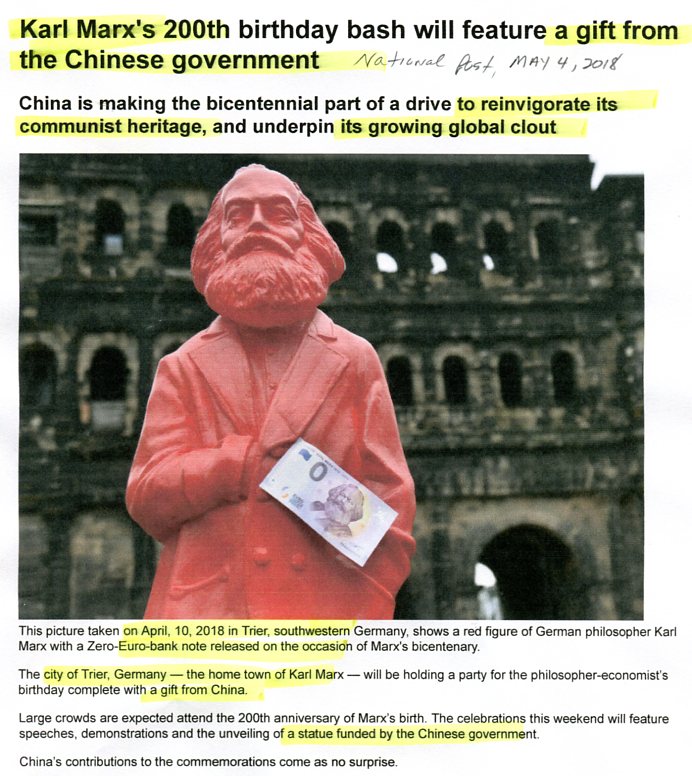
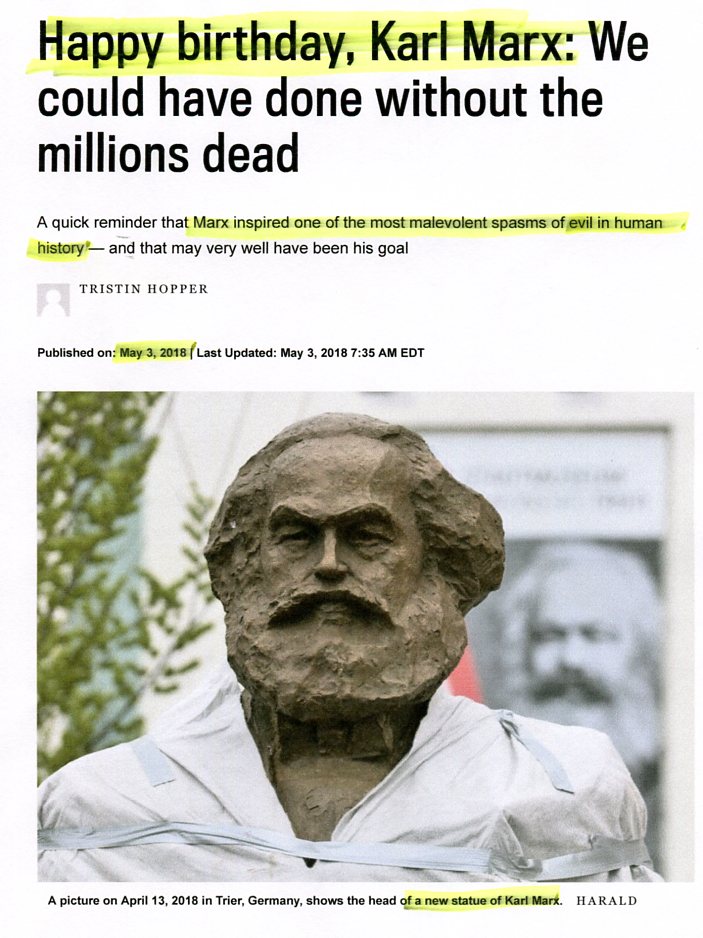

Communists celebrate Karl Marx 200th birthday
(most malevolent spasm of evil in human history)
Marx hometown statue gift from Communist China
GlobalNews, May 8, 2018
GOLDSTEIN CONSPIRACY IN 1984



ORWELL ARCH ENEMY OF MARX &
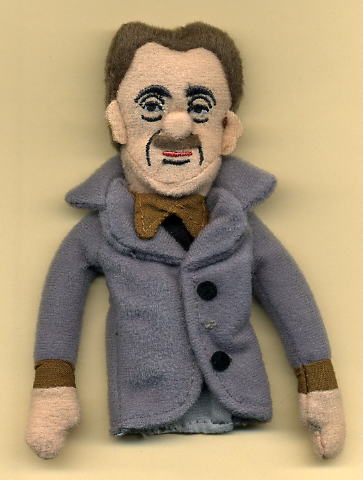
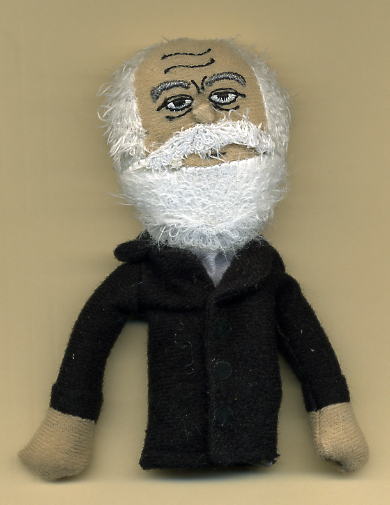

JFK OPPOSED COMMUNIST CONSPIRACY
& 35.Big Brother's Brotherhood
Gorbachev-linked tycoon becomes investigative journalist, RiaNovosta, Oct 13, 2013
MOSCOW - A Russian businessman known for ties to the last Soviet president, as well as brawling skills on camera, said he is trading entrepreneurship for journalism. “From Monday I am head of Novaya [Gazeta] investigations bureau,” Alexander Lebedev said in an English-language tweet on Saturday. “Pls stop calling me oligarch or banker, I am long paying a price for journalistic revelations in corruption and fraud,” he added, also in English. Lebedev, 53, was also cited by Russian media as saying he will use the considerable stock of compromising information he accumulated during his business career for exposés. Lebedev owns 39 percent of Novaya Gazeta, a liberal-minded newspaper founded in 1993 by Soviet leader Mikhail Gorbachev, who founded the publication using money from his Nobel Peace Prize and still controls a 10-percent stake in it.... Lebedev, a former KGB officer who made the 2013 Forbes Russia list with $600 million, has combined business ventures with opposition activism. He sat on the Russian parliament, run for the mayor of Sochi, which hosts the 2014 Olympics, and even tried to set up a political party together with Gorbachev. He has also backed Alexei Navalny, a prominent whistleblower and Kremlin-basher. Lebedev and his son Evgeny also co-own British newspapers The Independent and Evening Standard. Lebedev has been complaining in recent years of state pressure on his enterprises, which included banks and airlines, calling it retribution for his activism. Perhaps the stress got the better of him on 2011, when he knocked down fellow tycoon Sergei Polonsky with a suckerpunch on national television. Lebedev faced up to five years in jail over the brawl, but eventually got away with 150 hours of community service after celebrities including Keira Knightley, Elton John, Sting and Hugh Grant spoke in his defense.
WALT WHITMAN/PAUL POTTS & ORWELL



(Whitman Press almost published Animal Farm)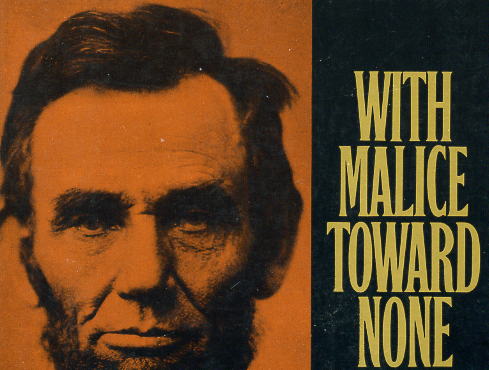

listen O Captain! My Captain! by Whitman
Email/YouTube, Sep 20, 2013
8.Classes of People
CRYSTAL SPIRIT ORWELL BBC FILM
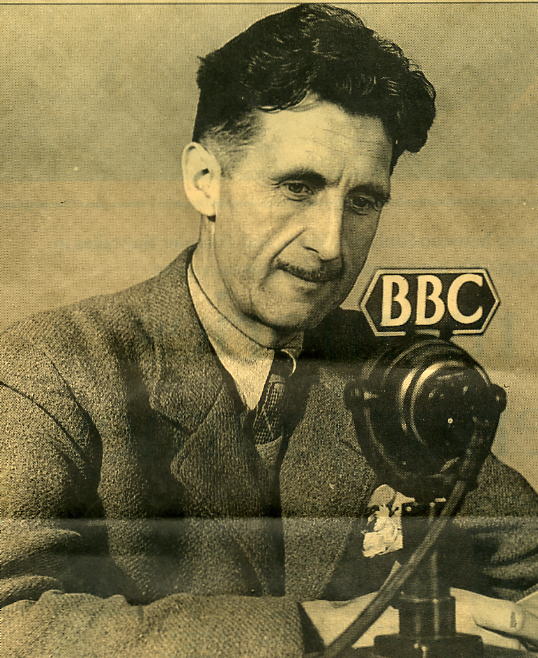

COMMUNISTS ENSLAVE BRITISH FREE PRESS


RUSSIAN KGB BUYS UK NEWSPAPERS
(120-million innocent deaths in 20th century)
watch The Bloody History of Communism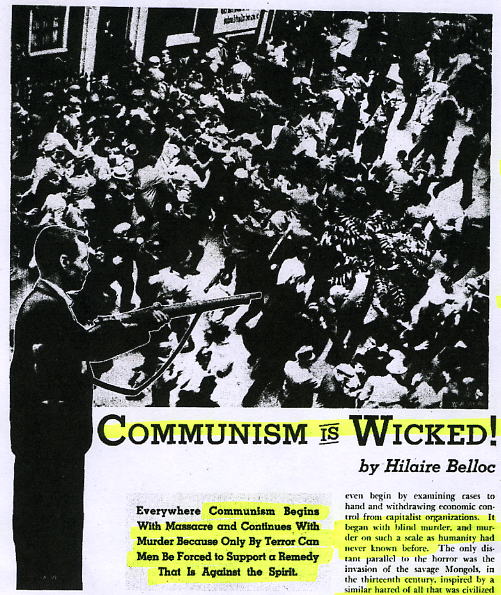


Belloc on Communism/Usury/TruthSuppression
Email/YouTube, Jul 29, 2013
Big Brother Tells How & Big Brother Tells Why
& MiniTrue & MiniPlenty & KeepMassesDown
 Russians flee to English estates, Reuters, Jun 30, 2012
Russians flee to English estates, Reuters, Jun 30, 2012
Russians accounted for 26% of sales of country homes worth more than $8-million in the first half of 2012, up 17% on the same period last year...Russians have been buying London homes for more than a decade...There are more Russians than any other nationalities bar the British buying such homes...Russians prefer country homes located within private gated estate...Many already have a central London home but see that property in the country is cheaper by quite some margin...They now want some outdoor space, privacy and the good schools of the country.
RT most watched foreign TV outlet in key US cities, Voices from Russia, Jun 4, 2012
A survey carried out by the Nielsen Company revealed that RT, formerly Russia Today, was the most popular foreign TV channel in five key US urban markets in 2011. The survey was carried out in Washington DC, New York City, San Francisco, Los Angeles, and Chicago. The channel’s American audience has more than doubled over the past year, making RT the most-watched foreign TV channel in those cities. Margarita Sminonyan, the RT’s editor-in-chief, said the channel is winning over US viewers by providing an alternative to the mainstream media. The RT website noted, “With a global reach of over 430 million people, or 22 percent of all cable subscribers worldwide, RT news covers the major issues of our time for viewers wishing to question more”.
Kremlin TV channel to US: No reset, VOA, Apr 21, 2012 ...For today’s junior Kremlinologists, there is a much more fun way to read between Russia’s lines: the website of RT, the government-owned English language TV station previously known as Russia Today. The key to RT is that it’s funded by the Russian Government. There may be a secret hotline, but there are layers of deniability between the Kremlin and the RT newsroom.
Russian oligarchs come to London, Russia beyond headlines, Jan 17, 2012
We may be anxious about the murky KGB histories of Russian oligarchs or the suspected shady criminality of their business methods, but we love to talk or read about the glamorous lifestyles of these ultra-rich people. After all, what could be sexier than an ex-spy with lots of money? And their fabled excesses and arguments amuse us as much as they appal us. So, whatever your interest – spy-catcher, gold-digger or just plain curious, we trace the tracks of some of the rich Russians in London....Alexander Lebedev, owner of the Russian newspaper, Novaya Gazeta, made headlines nearly three years ago when he bought up the local London paper, the Evening Standard. Nine months later he massively increased the circulation and made it free; the paper went on to win media awards for rejuvenating the brand. In 2010, Lebedev also bought the Independent newspaper. Both papers now operate from Northcliffe House on Derry Street in Kensington, in part of the art deco department store, Barkers, and opposite the building that boasts Europe’s largest roof gardens. Lebedev’s son, Evgeny, is chair of the companies that own both papers....
Tourists head to 'Gorbachev birthmark' archipelago, London Telegraph, Apr 1, 2011
Russian tycoon buys british newspapers, AFP/France 24, Mar 25, 2010
Russian tycoon Alexander Lebedev bought Britain's struggling Independent and Independent on Sunday newspapers for a token sum Thursday, a year after acquiring another top British title cheaply. Lebedev, an ex KGB agent, paid one pound (1.1 euros, 1.5 dollars) for the papers, while its current owners will pay 9.25 million pounds in the next 10 months to his firm Independent Print Limited for taking on future liabilities. The sale highlights the problems faced by many British newspapers who, like titles around the world, are struggling to attract advertising revenue and keep circulation high in the digital age. The two titles' previous owners, Dublin-based Independent News and Media (INM), announced the long-expected sale in a statement. "I believe that the Lebedevs will be progressive and supportive owners of the Independent titles which have played such an important role in British public life for nearly 25 years," said INM's group chief executive Gavin O'Reilly. Lebedev bought London's Evening Standard newspaper for a nominal one pound in January last year in a deal which made him co-owner with his son Evgeny. It became a free paper in October. The wealthy Russian oligarch, who has interests in banking and aviation, already co-owns with ex-Soviet leader Mikhail Gorbachev a 49-percent holding in the Novaya Gazeta newspaper, which has been critical of the Kremlin....
Russian billionaire refugees in England, Guardian, Mar 6, 2010
...In return for these tax savings, the government hopes that the super-rich will continue to jet in and out of London, buying up football clubs, mansions and industries. And maybe they will scatter a little largesse the way of the kindly government that allows such behaviour. Of the £188m raised by political parties between 2001 and 2008, some £17.5m came from those who had declared themselves to be non-domicile. All three main parties have benefited....In early 2009 I met a senior civil servant attached to No 10 who had noticed the overwhelming number of high net worth individuals "in the constant orbit of the government. You do see a number of Russian exiles meeting with cabinet ministers, although that has slightly decreased recently as ministers do their due diligence. Nonetheless, key individuals with key contacts can pretty much walk into the rooms they want. Indian industrialists are particularly in attendance, they probably have the edge over Russians. You noticed that really pick up under the Blair administration and it has continued under Brown. What you also notice is the way ministers' wives are part of the chain of access. The wives of the wealthy invite the wives of ministers to charitable events and then the husbands' conversations are all about business and politics." The civil servant has served under various administrations for many years but feels something has changed significantly. "The characters you see now are the names and faces that only have resonance on the financial pages or in the FT. They're the people who buy things rather than build them. There's the feeling that you've seen a slightly insidious takeover of the heights of the economy by people we know very little about and the links between them and government are cosier than ever before"...
Evening Standard newspaper, Wikipedia (The newspaper was founded by barrister Stanley Lees Giffard on 21 May 1827, as the Standard. The early owner of the paper was Charles Baldwin. Under the ownership of James Johnstone The Standard became a morning paper from 29 June 1857, The Evening Standard being published from 11 June 1859. The Standard gained eminence for its detailed foreign news, notably its reporting of events of the American Civil War (1861–1865), the Austro-Prussian War of 1866, and the Franco-Prussian War of 1870, all contributing to a rise in circulation....
Moscow Meets Fleet Street - Can A Russian Oligarch Save The British Press?, Spiegel, Feb 19, 2010
Lebedev and Rothermere: why does a Russian oligarch want to buy the London Evening Standard?, Guardian, Jan 8, 2009
First Roman Abramovich buys west London's most fashionable football team, now a Russian oligarch would like to get his hands on London's paid-for evening newspaper. Alexander Lebedev – a former KGB agent who made his £2bn fortune from banking – is understood to have made an approach to buy the London Evening Standard. The paper's proprietor, Lord Rothermere, is understood to have turned it down. So, why, would a Russian want to buy a British newspaper – particularly one in the middle of a fierce circulation war? And why would the Daily Mail & General Trust not want to sell? Since 2006 Lebedev, alongside Mikhail Gorbachev, has owned 49% of Novaya Gazeta. The newspaper has been a major critic of the Russian government and employed the murdered journalist Anna Politkovskaya. Lebedev and Gorbachev own 49% of the paper, with the other 51% owned by the staff. His son, Evgeny, is well known on the London social scene, even dating actress Joely Richardson. So Lebedev is clearly interested in the power of the press. He also has interests in London – he hosts high-society charitable events, raising funds for the Raisa Gorbachev Foundation...
The Prevention of Literature, by George Orwell, Polemic, January 1946; The Atlantic Monthly, March 1947
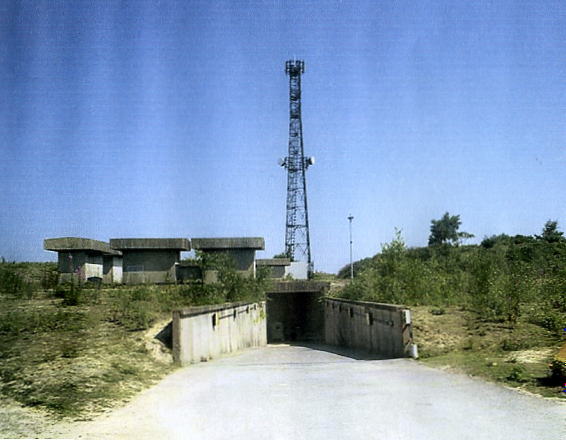 BIGGEST ASPIDISTRA IN ORWELL WORLD (Aspidistra, King's Standing, East Sussex was originally home to a high-power (600 kW) medium wave broadcasting transmitter, built for the Political Warfare Executive in WWII. This transmitter was purchased in the USA in 1941 and consisted of three 170-kW units connected in parallel. The underground site had been prepared with the assistance of Canadian forces personnel. The BBC obtained partial use of the station from 8th November 1942 to broadcast its European Service. At other times this transmitter, known colloquially as Aspidistra, was used by the PWE for 'black' broadcasting. This started on 30th January 1943...)
BIGGEST ASPIDISTRA IN ORWELL WORLD (Aspidistra, King's Standing, East Sussex was originally home to a high-power (600 kW) medium wave broadcasting transmitter, built for the Political Warfare Executive in WWII. This transmitter was purchased in the USA in 1941 and consisted of three 170-kW units connected in parallel. The underground site had been prepared with the assistance of Canadian forces personnel. The BBC obtained partial use of the station from 8th November 1942 to broadcast its European Service. At other times this transmitter, known colloquially as Aspidistra, was used by the PWE for 'black' broadcasting. This started on 30th January 1943...)
BIG BROTHER CAPITALIST COMMUNISM OLIGARCHICAL COLLECTIVISM
GULLIVER ON PROSTITUTE WRITERS
Jackie Jura
~ an independent researcher monitoring local, national and international events ~
email: orwelltoday@gmail.com
HOME PAGE
website: www.orwelltoday.com